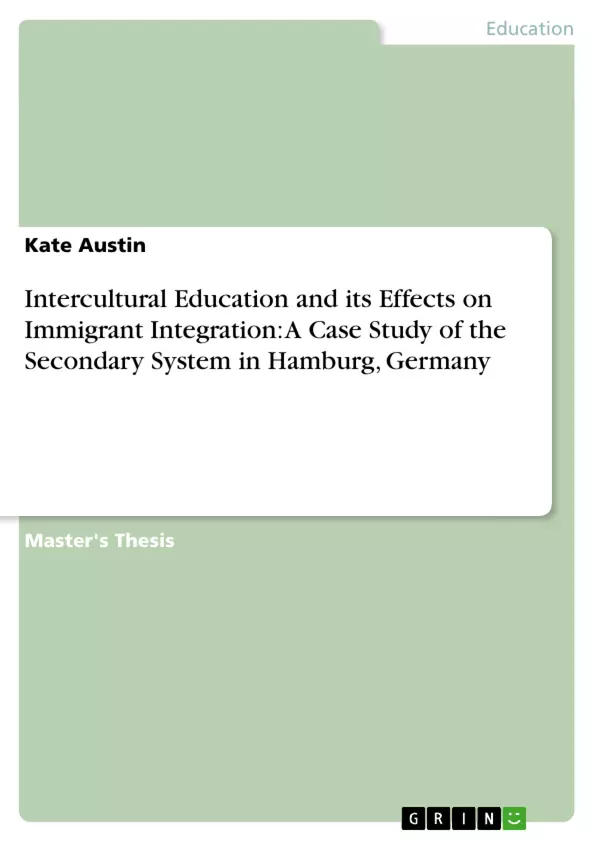This thesis addresses the topic of intercultural education and immigrant integration as it relates to the secondary school system in Germany. Student and teacher surveys were conducted in Hamburg, Germany. The results showed that students have frequent contact with people from various backgrounds and that many acknowledge the importance of intercultural education. However, while some noteworthy programs have been implemented, there remains room for improvement from the federal level down to the local level.
Inhaltsverzeichnis (Table of Contents)
- Introduction
- Literature Review
- Methodology
- Research Design
- Data Collection
- Data Analysis
- Findings
- Student Survey Findings
- Teacher Survey Findings
- Discussion
- Intercultural Education and its Effects
- Limitations of the Study
- Conclusion
Zielsetzung und Themenschwerpunkte (Objectives and Key Themes)
This thesis examines the relationship between intercultural education and immigrant integration within the secondary school system in Hamburg, Germany. The study aims to understand the extent to which intercultural education is implemented and its impact on the integration of immigrant students.
- The role of intercultural education in promoting immigrant integration
- The experiences and perspectives of both students and teachers regarding intercultural education
- The effectiveness of existing intercultural education programs in Hamburg
- Challenges and opportunities for improving intercultural education practices in German secondary schools
Zusammenfassung der Kapitel (Chapter Summaries)
The introduction sets the stage for the study by outlining the significance of intercultural education in the context of immigrant integration, particularly in Germany. It also provides an overview of the research questions and methodology employed. The literature review delves into relevant theoretical frameworks and empirical studies on intercultural education, immigrant integration, and the German education system. This section establishes a foundation for understanding the key concepts and debates surrounding the topic. The methodology chapter elaborates on the research design, data collection methods, and data analysis techniques used in the study. It provides a detailed account of the student and teacher surveys conducted in Hamburg. The findings chapter presents the results of the student and teacher surveys. It examines student experiences with intercultural interactions, perceptions of intercultural education, and the effectiveness of existing programs. Teacher perspectives on intercultural education, challenges they face, and their opinions on the integration of immigrant students are also explored. The discussion chapter analyzes the findings in relation to existing literature and theoretical frameworks. It discusses the implications of the research for policy and practice, highlighting the impact of intercultural education on immigrant integration. It also acknowledges the limitations of the study. The conclusion summarizes the key findings, reiterates the significance of the study, and provides recommendations for future research and practice in the area of intercultural education and immigrant integration in Germany.
Schlüsselwörter (Keywords)
The primary keywords and topics of the thesis include: intercultural education, immigrant integration, secondary education, Germany, Hamburg, student perspectives, teacher perspectives, policy implications, and research methodology.
Frequently Asked Questions
What is the focus of the study on intercultural education in Hamburg?
The study examines the relationship between intercultural education and the integration of immigrant students in Hamburg's secondary school system.
What were the main findings regarding student interactions?
The research showed that students have frequent contact with people from various backgrounds and recognize the importance of intercultural learning.
How do teachers perceive intercultural education in Hamburg?
Teachers acknowledge its significance but also highlight challenges and the need for better implementation and support.
Is the current educational policy sufficient for integration?
While programs exist, the study concludes there is significant room for improvement from the federal to the local level.
What research methodology was used in this thesis?
The thesis utilized surveys conducted with both students and teachers within the secondary system in Hamburg.
- Arbeit zitieren
- Kate Austin (Autor:in), 2009, Intercultural Education and its Effects on Immigrant Integration: A Case Study of the Secondary System in Hamburg, Germany, München, GRIN Verlag, https://www.grin.com/document/170476



